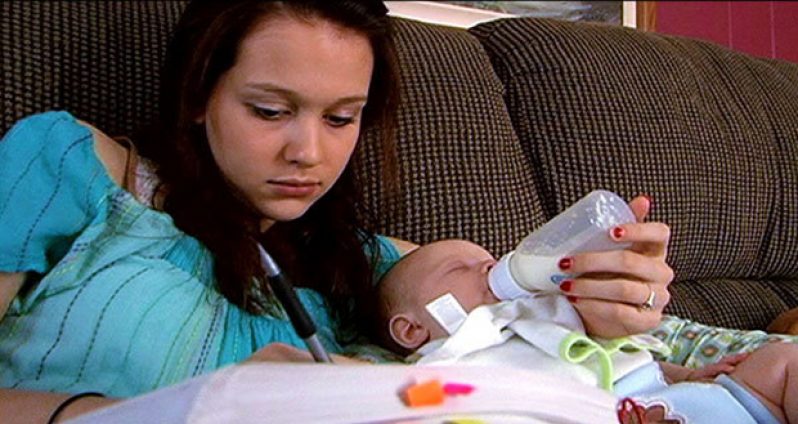CARIBBEAN Community Sates, including Guyana, are understandably quite depressed over the scourge of gun-related killings and general awful criminality. However, the very challenging problem of teen pregnancy, which has compelled a shift in CARICOM’s work agenda, may now require all countries to pay closer attention to this major social problem in this region.
Over the past week, the Inter-American Development Bank (IDB) disclosed, in its latest annual report, what is widely known by citizens across the Caribbean/Latin America region: Namely, that 2013 was not a good year for economic performance.
Additionally, that the forecast for 2014 is an estimated less than three per cent growth in gross domestic product (GDP).
But it is the assessment of a serious human rights threat facing teenage girls of our Caribbean Community, as assessed by the United Nations Population Fund (UNFPA) and CARICOM Secretariat, that’s the primary focus of this article.
With an estimated one-third of Caribbean teenage girls being married before their 18th birthday, among them those compelled to do so by unexpected/unplanned pregnancies, this very challenging problem had engaged the attention of CARICOM’s Council for Human and Social Development (COSHOD) during 2013.
The result was the commissioning of “a strategic framework on adolescent pregnancy” that subsequently provided a most useful report to inspire initiatives for action.
Major consultation
It has already resulted in at a major consultation, jointly organised by the CARICOM Secretariat and the UN agency in Port-of-Spain early last month, and involving participation by representatives from the region’s private sector and non-government organizations (NGOs).
CARICOM Assistant Secretary-General, Dr Douglas Slater, has noted in an overview of the challenge to be faced, that “adolescent pregnancy and births should not be seen merely as a reproductive health issue…”
“There are,” he contends, “substantial economic, social and human cost attached to them and tackling this issue should be a priority in every member state of the Community.”
The promise arising from last month’s consultancy — a partnership initiative of CARICOM, UNFPA and the Trinidad and Tobago Government — was the development of what has been presented as a “new holistic approach to minimise the occurrence of adolescent pregnancy that draws on the experience and strengths of all regional stakeholders.”
According to the UNFPA’s ‘State of the World Population Report’ for 2013, “motherhood in childhood is a huge global problem, especially in developing countries where, every year, some 7.3 million girls under the age of 18 give birth…”
In the case of CARICOM, despite an overall fall in total fertility rate, adolescent birth rates remain relatively high. As pointed out by the CARICOM Secretariat, among girls aged 15-19 years old, the birth rate ranges from 26 to 97 per one thousand adolescents.
Guyana, Belize, Jamaica, Antigua and Barbuda and Suriname are reported to have the highest teen pregnancy in the Caribbean region.
New T&T move
As governments and agencies like UNFPA ponder initiatives to address the social and economic consequences of teenage pregnancy, Prime Minister Kamla Persad-Bisseasar has raised a related issue that’s a problem for more than Trinidad and Tobago.
A former Attorney-General in a previous administration, she has fingered as a challenging problem that requires “urgent attention”, the need for mandatory schooling up to 16 years of age for both male and female students, instead of the current school-leaving option at age 12.
Last month, the Prime Minister disclosed her intention to introduce legislation, early this year, to make it mandatory for school enrolment to begin at the age of five years, and end at 16.
Currently, school enrolment, nationally, is from six to 12 years. The Prime Minister’s intention, as she said, is to ensure “equality in education” with girls in mind who are often influenced, for varying reasons, to leave school too early…”
She, of course, would be aware that this is partly a related cultural problem in plural CARICOM societies, like Guyana and T&T in particular, where ethnic and religious norms often influence early marriage for teenage girls, as well as leaving school.
Jamaica’s perspective
Meanwhile, in Jamaica, Information Minister, Sandrea Falconer, has a different concern, involving the spreading regional problem of teenage pregnancy.
She wants priority attention to be given to amend the law to end the current contradiction of Jamaica having 18 years as the “adult age”, while both boys and girls are legally able to have consensual sex at 16.
Therefore, when she addressed the CARICOM/UNFPA consultation last month, Minister Falconer took the opportunity to focus on the necessity for ending this contradictory situation as part of Jamaica’s own efforts to deal with the problem of teenage pregnancy.
Sex, she argues, should be “an adult thing”, and the “adult age” in Jamaica is 18 (as recognised in some other CARICOM states). Therefore, it’s time to put an end to encourage, by existing law, having consensual sex at the age of 16.
Now that we have moved into 2014, amid much apprehension over economic and social problems, particularly gun-related criminality, incidence of rape and rising teenage pregnancy, there would be anxiety to learn of progress in the initiatives to flow from last month’s CARICOM/UNFPA consultation.
The negative consequences of rising teenage pregnancy are simply too challenging to ignore by ANY member State of our Caribbean Community.
Analysis by Rickey Singh





.jpg)








